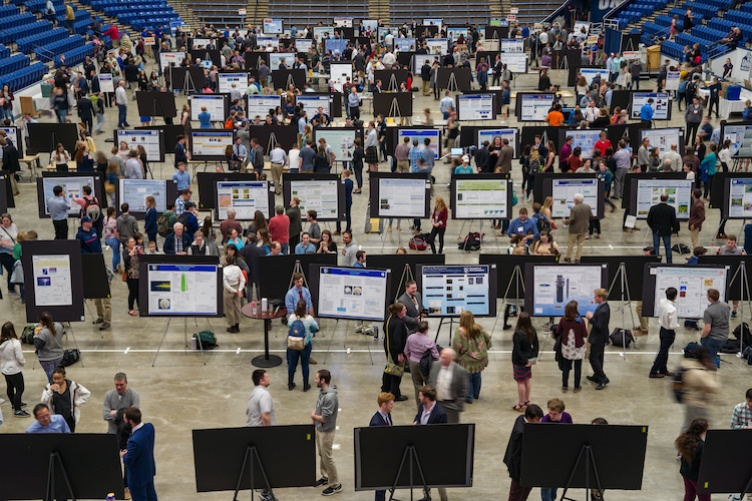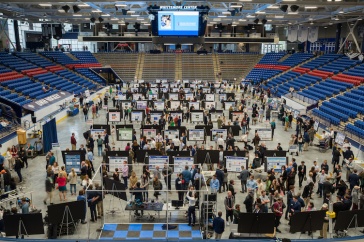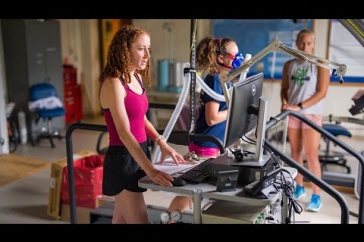
In years past, this is what a URC presentation would look like. This year the research conference has gone virtual.
Twenty-one years ago, the inaugural UNH Undergraduate Research Conference fielded the work of some 159 students over the course of two days. In 2019, the 20th anniversary of the event, that number had swelled to more than 2,000 students from all majors and spanned 13 days.
This year, by the March 4 registration deadline, 1,858 students had signed up to present the research projects they had been working on for months. Then, on March 18, campus was closed, and students were sent home to finish the semester remotely. One day later, organizers of the URC made the first move to take the research conference virtual.
“We had very little time to shift gears, identify one shared virtual platform that would work for most if not all 20-plus events, and work out the logistics,” says Molly Doyle, administrative director for the Hamel Center for Undergraduate Research.
By April 1, with the help of UNH Academic Technology, a platform had been identified. And that was the beginning. An online gallery to accommodate individual URC events was created, and guidelines were drawn up to aid coordinators in shepherding students through the process of reimagining their in-person presentations for a virtual format. All of the research projects are being presented remotely and prerecorded. Viewers can visit the URC site and watch any of the presentations at their convenience.
Not all of the students who registered were able to make the switch to online, but there are many who did. “Our undergraduates have risen to the challenge of a virtual URC with real creativity and spirit,” Doyle says. “Though they were working remotely from home, often with unfamiliar technology, the results are impressive.”
On April 24, senior Madeline Karlberg, an accounting and finance major in the Peter T. Paul College of Business and Economics, presented her research before a remote judge. She won first place in her category.
“Switching to virtual was definitely different and not what I was planning on when I first started working on my URC preparation,” says Karlberg. But she was quick to point out the positive. “I think I would have had a more difficult time speaking in person in front of judges and having to answer questions on the spot. Being able to really think about my response and almost script exactly which points I wanted to highlight helped me get my point across faster and more clearly.”
Karlberg, a peer advisor for the Paul College FIRE (First-year Innovation and Research Experience) program, was responsible for making sure her team put together the best presentation they could. Twenty-nine teams with approximately 20 first-year students in each have been working on their projects since the fall semester.
Faculty mentors are a critical factor in the 21 years of success that URC has enjoyed. They spend months with undergraduates, helping them hone their research skills and clarify their objectives. While the move online created challenges to the mentors in offering guidance and support, as with students, they quickly adjusted.
“For 21 years, the URC has been UNH’s premier celebration of our students’ innovative research and academic excellence and our faculty’s dedication as mentors and scholars,” UNH President Jim Dean says in his online introduction to URC. “This year’s virtual URC has certainly challenged them to be more creative and determined than ever.”
-
Written By:
Jody Record ’95 | Communications and Public Affairs | jody.record@unh.edu

















































